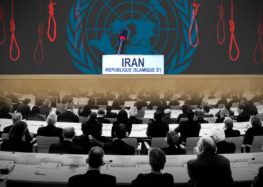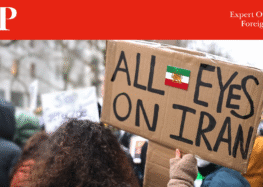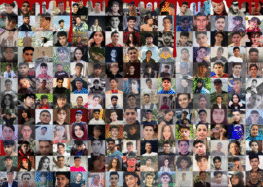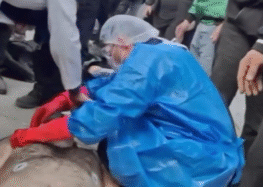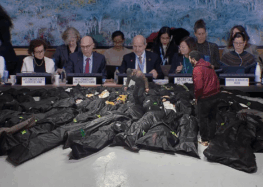“My husband is being deprived his most basic right,” says Jila Baniyaghoub
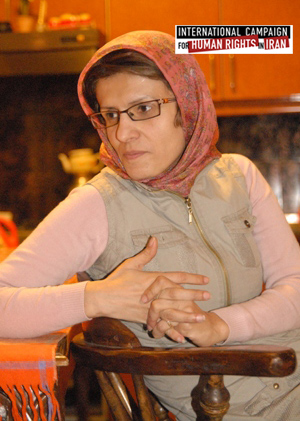 Journalist Jila Baniyaghoub has received one of the most peculiar sentences of recent years, a 30-year ban on journalistic activity. In an interview with the International Campaign for Human Rights in Iran, she described details of her case and a conversation she had about her sentence with the judge. She also described the conditions of her imprisoned husband, journalist Bahman Ahmadi Amooee. She says Amooee is deprived of “his most basic right” of visiting his wife in person. “I can only see him once a week for 20 minutes through a phone booth, behind a glass wall. According to the Prisons Organization’s Procedures, prisoners are entitled to one in-person visit every month. But in the past year that Bahman has been imprisoned, he has only been allowed in-person visits three times. I don’t understand why he has been deprived of seeing his family, and particularly his wife, in person.”
Journalist Jila Baniyaghoub has received one of the most peculiar sentences of recent years, a 30-year ban on journalistic activity. In an interview with the International Campaign for Human Rights in Iran, she described details of her case and a conversation she had about her sentence with the judge. She also described the conditions of her imprisoned husband, journalist Bahman Ahmadi Amooee. She says Amooee is deprived of “his most basic right” of visiting his wife in person. “I can only see him once a week for 20 minutes through a phone booth, behind a glass wall. According to the Prisons Organization’s Procedures, prisoners are entitled to one in-person visit every month. But in the past year that Bahman has been imprisoned, he has only been allowed in-person visits three times. I don’t understand why he has been deprived of seeing his family, and particularly his wife, in person.”
Baniyaghoub is a prominent Iranian journalist who was recently given the Courage in Journalism Award. She has worked on the editorial boards of newspapers such as Norooz, Vaghaye Ettefaghieh, Sarmayeh, Hamshahri, Khordad, Azad, and Aftab Emruz. She is also an editor for the Focus on Iranian Women website and winner of the Freedom of Speech Award from the Canadian Journalists Association in the best Iranian blogs contest. Baniyaghoub is also a member of the One Million Signatures Campaign.
Regarding her sentence she said, “What image exactly does the judge have of a human being and her future, the future of a society, and even the future of a profession, to make such a decision about her for the next 30 years? What would journalism look like in the next five years? How about in ten years? And in 20 or 30 years? What will my and the society’s conditions be in five, 20, or 30 years to warrant such a sentence?! After my sentence was announced, I told the judge, ‘I am so surprised by your ruling! When you were writing this sentence, did you even think whether you or I would be around in 30 years? And how the field of journalism might change?’ ‘I hope you will be around, God willing. Even if I won’t be around, another person will be,’ he replied.”
Baniyaghoub and her husband Bahman Ahmadi Amooee were arrested in their home on 20 June 2009. After 60 days in prison, Baniyaghoub was released on bail. In June 2010 she was sentenced to one year in prison and was banned from the profession of journalism for 30 years. Amooee was sentenced to five years in prison.
Baniyaghoub is one of the first independent female journalists in Iran. During her years of journalism she has been repeatedly summoned and detained. She has published more than 400 reports covering various issues like the conditions of education for women, prostitution, youth suicide, and the wars in Iraq, Afghanistan, and Lebanon.
Transcript of interview with the Campaign
Campaign: Was there a precedent for such a ruling?
Baniyaghoob: Yes. There has been a precedent. Prior to my sentence, Ahmad Zeidabadi received an even heavier sentence, and it was lifetime deprivation of journalistic, social, and political activities. The way I understand it, Judge Pirabbasi has given me a lighter sentence than Mr. Zeidabadi’s.
Campaign: What does the 30-year ban from your writing profession mean to you exactly?
Baniyaghoob: I don’t exactly understand the meaning of depriving a person’s civil rights for thirty years, which in my case is denial of my profession and the use of my expertise. What image exactly does the judge have of a human being and her future, the future of a society, and even the future of a profession, to make such a decision about her for the next 30 years? What would journalism look like in the next five years? How about in ten years? And in 20 or 30 years? What will my and the society’s conditions be in five, 20, or 30 years to warrant such a sentence?! After my sentence was announced, I told the judge, “I am so surprised by your ruling! When you were writing this sentence, did you even think whether you or I would be around in 30 years? And how the field of journalism might change?” “I hope you will be around, God willing. Even if I won’t be around, another person will be,” he replied.
Campaign: What charges caused this ruling, and which one of your writings were the basis for this sentence?
Baniyaghoob: More than ninety percent of the charges levied against me are for articles and reports I have written. Of course one of the charges was for my activities in the One Million Signatures Campaign Against Discriminatory Laws. They had focused more on the reports that I had prepared about events before the election, and of people’s rallies a few days after the election. A significant part of these reports is really about events prior to the election; reports that I had prepared about Campaign supporters’ activities. I had even written a critique of Mr. Ahmadinejad’s campaign film, which turned into a charge against me. Of course the interesting thing is that I had also written another critique for Mr. Mousavi’s campaign film. During the interrogations, I even asked, “If writing a film critique is a crime, why not try me for writing one for Mir Hossein Mousavi?
Other charges against me are for my trips to Western countries and preparing reports from there, which is also very strange. According to my lawyer, Ms. Farideh Gheirat, visiting other countries is not only not a crime, on the contrary it is a requirement and characteristic of journalism. Of course, the court, the judge, and the interrogator’s sensitivity were focused on traveling to Western countries, which my attorney addressed in her rebuttal bill. She wrote that although traveling to Western countries is not a criminal act, my client (Jila Baniyaghoob) has traveled extensively in the [Middle East] region, including Afghanistan, Iraq, Syria, Lebanon and Palestinian camps.
Campaign: Is there any evidence in your file to indicate collusion and participation in demonstrations?
Baniyaghoob: About this charge there was no evidence, and this is why this charge was dropped. My articles were used as evidence for the charge of propagation against the regime.
Campaign: Was your lawyer’s defense, refuting the mentioned charges, considered by the court?
Baniyaghoob: If they were considered I wouldn’t have received the maximum penalty from the judge.
Campaign: Do you currently have any journalistic activities?
Baniyaghoub: If you want the truth, I have said this many times before, in reality we have been banned from journalistic activities for many years, because of the widespread bans on newspapers. Now my only activity is to occasionally write in my personal blogs.
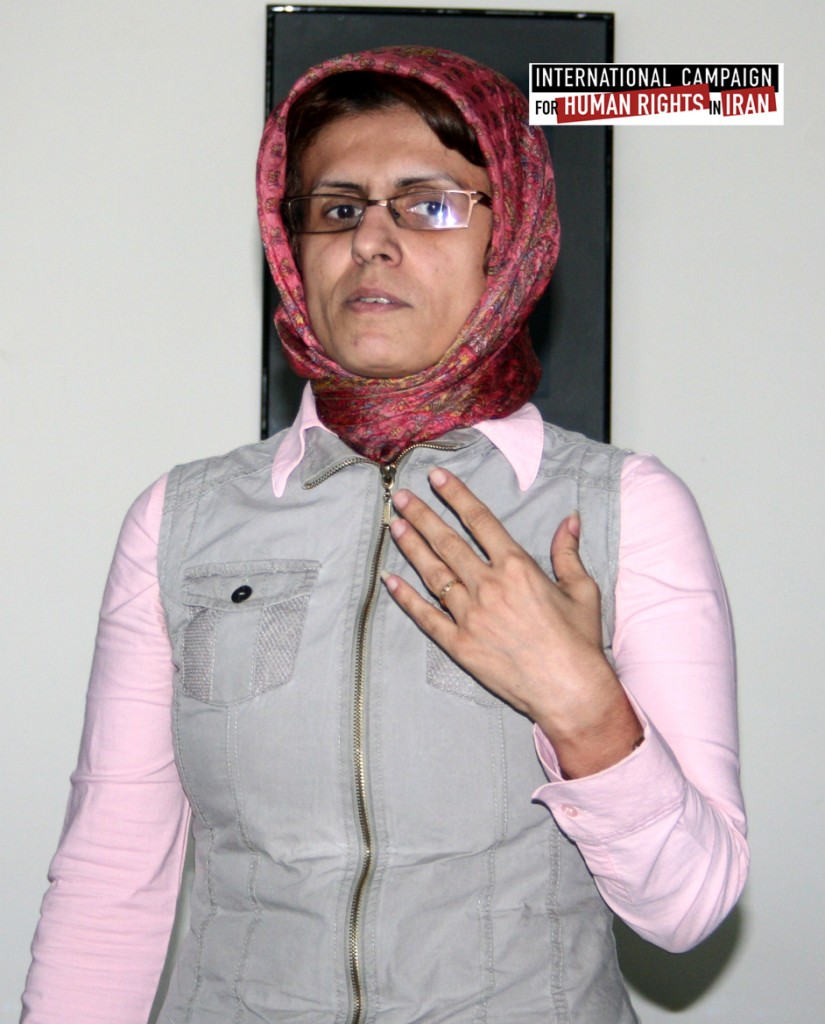
Campaign: Considering the disproportionate punishment you have received for your charges, do you intend to file charges against the judge in addition to appealing the sentence?
Baniyaghoub: My attorney will have to decide about this issue.
Campaign: What were the reactions from lawyers, legal experts and journalists to your sentence?
Baniyaghoub: This has created widespread objections among Iranian journalists and civil activists.
Campaign: What is the status of Bahman Ahmadi Amooee’s case right now?
Baniyaghoub: Judge Pirabbasi has sentenced Bahman to five years in prison, too.
Campaign: What are Mr. Amooee’s charges?
Baniyaghoub: The only evidence and documents that are in Bahman’s file are the articles and reports he wrote. His journalistic activities are used as evidence against him. For example, he was editor of Khordad-e-Now website. This was used as evidence of his mutiny to congregate against national security. According to the law, a mutiny is when something is done secretively with the aim to conspire. I don’t understand how the editor of a website whose job is quite public can be in mutiny. Another one of his charges is disrupting public order. He received this charge because he was assigned to report on the 15 June 2009 gathering. He provided documents to the court; he even provided the letter of assignment from the newspaper’s editor-in-chief, but the court didn’t pay any attention to the documents. Most of the articles they used as evidence against Bahman were articles he has written over the past few years, criticizing the performance of Ahmadinejad’s cabinet, particularly the economic performance.
Campaign: What is your biggest problem with Mr. Amooee’s situation right now?
Baniyaghoub: Well, there are a lot of problems, but Bahman is deprived of his most basic right, which is the possibility of visiting with his wife in person. I can only see him once a week for 20 minutes through a phone booth, behind a glass wall. According to the Prisons Organization’s Procedures, prisoners are entitled to one in-person visit every month. But in the past year during which Bahman has been imprisoned, he has only been allowed in-person visits three times. I don’t understand why he has been deprived of visiting with his family and particularly with his wife in person. I also hope that Bahman is given the opportunity to use his furlough rights so that he can go and visit his mother. His old mother lives in the Charmahal o Bakhtari Province and is completely sick and bedridden. It is not possible for her to travel to Tehran to visit with Bahman and only Bahman can go to visit her which can only be accomplished through furlough leave.

